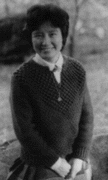|
|
Vocabulary Build-Up |
| The underlined words in the
following sentences are from the essay "Double Beds."
Try to understand what these words mean without consulting a dictionary. Click まず難しい単語をチェックしておきましょう。辞書は使わずに、下線を付けた単語の意味を文脈からつかみましょう。 |
|
|
The Wonderful World of Japanese Writers of English |
|
| Here's an essay, story, and poem written originally in English. |
|
|
Vocabulary Build-Up |
| The underlined words in the
following sentences are from the essay "Double Beds."
Try to understand what these words mean without consulting a dictionary. Click まず難しい単語をチェックしておきましょう。辞書は使わずに、下線を付けた単語の意味を文脈からつかみましょう。 |
|
|
by Ono Satoyo |
|
One of the things in America that I found difficult to understand
was their preoccupation with double beds. In the U.S.A. it seems
to be expected that a couple will sleep in a double bed. But
that must surely make it difficult for either partner to get
a good night's sleep. When one person turns in the bed, the other
person must be aware of it. Also, if one person has a cold, the
other person will probably catch it. And if one partner snores,
then the other partner is unlikely to get a good night's sleep. In the case of our own marriage, my husband and I sleep in separate rooms in our house in Japan. We made this agreement before we got married, some twenty years ago. When I told my friends about this agreement, they said it felt very cold and unfriendly and urged us to give up the idea. When we didn't have any children for three years, my friends thought that this must surely be the reason. They urged us to be more friendly as a couple and to sleep in the same room. When eventually we did have two children, our friends dropped the subject altogether. Sometimes my friends ask me if I don't get lonely. I don't,
but perhaps it is just a matter of habit. I think having too
much intimacy is not good for a marriage and that it is necessary
to have a private room so that each one can be his or her self.
I also think it is important to maintain a certain amount of
distance from each other. If there is this distance or privacy,
then it is more likely the relationship will remain fresh and
meaningful, and the couple will be able to keep their youthful
feelings even after living together over a long period. |
|
|
|
次の質問に答えましょう。 1. The author mentions one preoccupation of Americans. What
would you say is a preoccupation of the Japanese? |
|
|
| Write a one-paragraph essay
on any one: 次の3つの中からひとつ選んで、ワンパラグラフエッセイを書きましょう。 下のモデル(大学生が書いたもの)を参考にしてもいいでしょう。 1. Bread or Rice? . 2. University and High School Lifestyles 3. Rock or Classical Music? |
|
Model 1 American college or university students study much harder
than their Japanese counterparts. In Japan, students study hard
to enter a good university. But once they have passed the entrance
examination, they do not have to study hard. The reason is that
in Japan students are not often failed and seldom have to give
up college or university because they cannot keep up with their
studies. In comparison, American students can easily enter university,
but it is not easy to graduate since students are given regular
research and study projects in addition to examinations. So it
is not surprising that Japanese students do not work as hard
as their American peers. -Nagakusa Miyuki |
|
|
| Write a one-paragraph essay
on any one: 次の3つの中からひとつ選んで、ワンパラグラフエッセイを書きましょう。 下のモデル(大学生が書いたもの)を参考にしてもいいでしょう。 1.School uniform 2.Why I like/dislike the zoo 3. Apartheid |
|
Model 2 I am against "Miss Contest". I think that it is wrong to bring lots of young women together and then compare their height, weight, length of legs, skin color, ad nauseum as though they are cows or cars. I can accept the idea of a "Cow Contest" or a "Car Contest". But women are human beings! Every woman, man, and child in the world is unique, and therefore beautiful! I hope people everywhere will realize this, and there will be no "Miss Contest" in future. - |

|